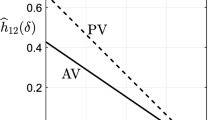Abstract
Brams, Fishburn, and Merrill (1988) contend that the indeterminacy of approval voting (AV), introduced in our paper (1988), is not a vice, but a surpassing virtue of AV. They do not compare the negative versus the positive features of AV, so their assertion remains a conjecture. Our response emphasizes the need to determine the costs of AV and to evaluate them against any merits. Moreover, by correcting and answering BFM's comments, the argument against AV becomes much stronger. This is because we show that AV's region of indeterminacy is quite large; it includes most profiles. Some of the consequences of this instability are that the AV outcome can negate the voter's true wishes, that the AV outcome can be volatile even to minor fluctuations of voter's decisions, and that AV is one of the most susceptible systems to manipulation by small groups of voters (for example, small, maverick groups could determine the AV outcome). Under specific circumstances, AV may be appropriate. To identify these situations we propose the more accurate name of the "Unsophisticated Voter System."
Similar content being viewed by others
References
Brams, S., and Fishburn, P. (1982). Approval voting Boston: Birkhauser.
Brams, S., and Fishburn, P. (1984). Manipulability of voting by sincere truncation of preferences. Public Choice 44: 397–410.
Brams, S., Fishburn, P., and Merrill, S. (1987), The responsiveness of approval voting: Comments on Saari and Van Newenhizen, Public Choice 59: 121–131.
Gillman, L. (1987) Approval voting and the coming MAA elections. Focus, (March–April).
Hurwicz, L. (1972). The design of mechanisms for resource allocation. American Economic Review 63: 1–30.
Niemi, R. (1984), The problem of strategic behavior under approval voting. American Political Science Review 78: 952–958.
Sanford, T. (1985). Personal letter to D.G. Saari, dated 19 April 1985.
Saari, D.G. (1985) The optimal ranking method is the Borda Count. NU Discussion paper #636; a related discussion paper is entitled A dictionary for voting paradoxes.
Saari, D.G. (1986). Susceptibility to manipulation, NU preprint. A revised version appears as a 6/87 NU Center for Mathematical Economics Discussion Paper.
Saari, D.G. (1987a) Chaos and the theory of elections. In Dynamical systems, 179–188. Lecture Notes in Economics and Mathematical Systems #287. New York: Springer-Verlag.
Saari, D.G. (1987b). The source of some paradoxes from social choice and probability. Journal of Economic Theory 41: 1–22.
Saari, D.G., and Van Newenhizen, J. (1988). The problem of indeterminacy in approval, multiple, and truncated voting systems. Public Choice 59: 101–120.
Weber, R. (1977). Multiply-weighted voting systems. Mimeograph.
Author information
Authors and Affiliations
Additional information
This research was supported, in part, by NSF grant IST-8415348. We thank Peter Aranson for his helpful comments both with this essay and with S&VN.
Rights and permissions
About this article
Cite this article
Saari, D.G., Van Newenhizen, J. Is approval voting an ‘unmitigated evil’?: A response to Brams, Fishburn, and Merrill. Public Choice 59, 133–147 (1988). https://doi.org/10.1007/BF00054449
Issue Date:
DOI: https://doi.org/10.1007/BF00054449



